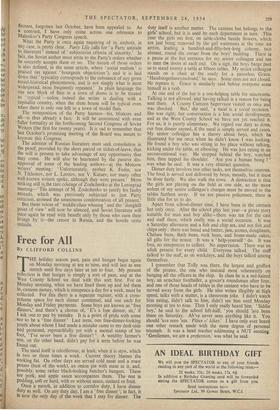Free for All
BY CLIFFORD COLLINS THE holiday season past, pain and hunger begin again on Monday morning at ten to nine, and will last at one stretch until five days later at ten to four. My present reflection is that hunger is simply a sort of pain, and at the West County School we deal with this sort first. For on Monday morning, when we have lined them up and led them in, canteen money, which is ninepence a day for a week, must be collected. For this there is a separate register, with a cross- column space for each dinner consumed, and one each for Monday and Friday payments. Some boys are known as ' free dinners,' and there's a chorus of, ' E's a free dinner, sir,' if I ask one to pay by mistake. It is a point of pride with some not to be a ' free dinner.' Last term, one free-dinner-looking youth about whom I had made a mistake came to my desk-side and protested, reproachfully yet with a mental stamp of his foot, ' I've never been a free dinner! ' A wealthy farmer's son, on the other hand, didn't pay for a term before he was found out.
The meal itself is odoriferous; at least, when it is stew, which is two or three times a week. Current theory blames the cooking fat. On other days are served cold meat and a roast Potato (best of the week), an onion pie with meat in it, and, possibly, some rather black looking butcher's bangers. These are pork, and apple sauce accompanies them. The rest is pudding, soft or hard, with or without sauce, custard or fruit. Once a month, in addition to corridor duty, I have dinner duty as well. On any duty day, I am a ' free dinner '; in fact, it is now the only day of the week that I stay for dinner. The duty itself is another matter. The canteen but belongs to the girls' school, but it is used by each department in turn. This year the girls eat first, on table-cloths beside flowers, which are just being removed by the girl waitresses at the time we arrive, leading a hundred-and-fifty-boy-long column, two abreast, round. the corner from the boys' building. There is a pauSe at the but entrance for my senior colleague and me to man the doors at each end. On a sign, the boys barge past us to stand twenty a table at fifteen tables. My senior colleague stands on a chair at the ready for a pauseless Grace. Handstogethereyesclosed,' he says. Some eyes are not closed. He repeats it. Grace is similarly said before everyone seats himself in a rush.
At one end of the but is a one-helping table for miscreants.
Talking is not allowed, and having talked is a reason for being sent there. A County Canteen Supervisor visited us once and was shocked. ' But,' she said, ' a meal is a social occasion.'
She was right; but conversation is a late social development, and at the West County School we have not yet reached it.
For us, it is purely alimentary. We regard our duty as done, our free dinner earned, if the meal is simply served and eaten. My senior colleague has a theory about boys, which he illustrated for me once when he didn't know I was looking.
He found a boy who was sitting in his place without talking, kicking under the table, or elbowing. He was just eating in an unconventional way. He stopped behind the boy, watched him, then tapped his shoulder. Are you a human being ? ' was what he said. It was a very abstract question.
Dinner duty involves two other tasks, not themselves onerous. The food is served and delivered by boys; messily, but it must be done fairly. We also walk the rows. A distraction is that the girls are playing on the field at one side, so the more ardent of my senior colleague's charges must be moved to the tables furthest away. If we are passive policemen, there is little else for us to do.
Apart from school-dinner time, I have been in the canteen but only once. After the school play last year—a pirate story suitable for man and boy alike—there was tea for the cast and staff there, which really was a social occasion. It was a Saturday afternoon and a fish and chip tea, and not fish and chips only : there was bread and butter, jam, scones, doughnuts.
Chelsea buns, Bath buns, rock buns, and home-made cakes, all gifts for the nonce. It was a help-yourself ' do. It was free, no ninepences to collect. No supervision. There was an adult present for every child. Everyone talked. The staff talked to the staff, as on weekdays, and the boys talked among themselves.
I remember that Toffy was there, the largest and gruffest of the pirates, the one who insisted most vehemently on hanging all the officers in the ship. In class he is a red-haired boy, an armchair footballer, a grocer's roundsman after four, and one of those heads of tables in the canteen who have to be moved away from the girls. He also writes illegibly at high speed, talks with a stutter, is a classroom joke. 1 didn't watch him eating, didn't talk to him, didn't see him until Monday morning at ten to nine. Then I only really heard him. Siddie boy,' he said to the school left-half, you should 'ave been there on Saturday. Ah've never seen anything like it. You should 'ave seen 'em. Plites o' kikes.' I have only ever heard one other remark made with the same degree of personal triumph. It was a head teacher addressing a NUT meeting. ' Gentlemen, we are a profession,' was what he said.


































 Previous page
Previous page